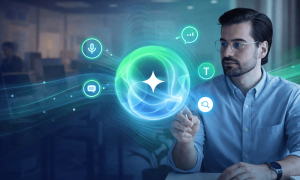When a workplace faces a traumatic event, from layoffs and accidents to emotional burnout or sudden losses, leaders often struggle to respond effectively. While traditional support systems take time to activate, AI psychological first aid tools are changing how organizations provide immediate care, comfort, and connection to employees in distress.
These AI-driven tools offer real-time emotional triage, providing compassionate guidance and resources when human support might not be instantly available. For modern workplaces focused on mental health, this combination of speed, empathy, and technology is reshaping crisis response.
What Is AI Psychological First Aid?
Psychological first aid (PFA) is an evidence-based approach used to support individuals after distressing events. It focuses on listening, ensuring safety, and connecting people to further help — not diagnosing or treating mental illness.
AI psychological first aid translates these same principles into digital form using intelligent systems like crisis management chatbot platforms and post incident support AI modules.
These systems can:
- Provide immediate, calm responses after a critical event.
- Offer grounding or breathing exercises through voice or chat.
- Suggest next steps, such as connecting with a counselor or EAP resource.
- Track emotional patterns using employee sentiment AI systems to flag ongoing distress.
By integrating these digital assistants into corporate wellness systems, organizations can ensure that help is always on standby.
The Growing Need for Digital Crisis Response
In high-pressure industries such as healthcare, logistics, and finance employees often face emotional strain due to long hours, safety risks, or difficult decisions.
According to a 2024 report by Deloitte, 62% of employees say they’ve experienced a workplace crisis that impacted their mental health in the last two years.
However, less than half felt their organization had adequate post-incident support.
That’s where trauma response AI systems play an essential role. They enable teams to receive emotional check-ins, guided journaling, and gentle coping suggestions immediately after an event — filling the critical gap between an incident and human follow-up.
How AI Helps in Crisis Intervention
AI-based PFA tools operate using natural language processing and emotional recognition to identify distress signals. When employees express stress or fear, these systems can assess tone, keywords, or sentiment, then offer tailored responses.
Here’s how AI psychological first aid typically works in a workplace setting:
| Step | AI Role | Example |
| 1. Detection | Identifies emotional distress in messages, calls, or chats. | Sentiment shifts in emails after layoffs. |
| 2. Response | Offers empathetic text or voice support. | “You’re not alone. Let’s take a short grounding exercise.” |
| 3. Resource Linking | Directs users to wellness programs or helplines. | Connection to AI assistance program3 or HR counsellor. |
| 4. Tracking | Monitors recovery progress through follow-ups. | Uses digital resilience AI to observe stress patterns. |
This structured approach ensures that no employee feels unseen during moments of vulnerability.
Real-World Use Cases in Organizations
Forward-thinking companies are adopting AI psychological first aid as part of their emergency response framework.
For example:
- A global logistics company uses crisis management chatbot tools to guide drivers through calm breathing and reflection after road accidents.
- A financial institution integrates post incident support AI within its HR app, offering 24/7 emotional support and journaling exercises.
- Tech firms leverage AI for EAPs (Employee Assistance Programs) to ensure employees can confidentially reach virtual emotional support within minutes.
These tools don’t replace therapists, they extend access to early-stage mental health care. This proactive layer helps prevent small issues from escalating into full-scale burnout or trauma.
Building a Culture of Care Through Technology
Organizations that prioritize emotional health are seeing tangible business benefits. According to Gallup, companies with strong wellbeing cultures report 41% lower absenteeism and 17% higher productivity.
Integrating AI psychological first aid helps leaders reinforce these cultures — especially in hybrid and remote environments. A thoughtful system can recognize signs of distress through communication data or self-reported inputs and provide personalized suggestions like:
- “Try a quick AI sleep meditation session before your next shift.”
- “Here’s a short 2-minute breathing practice from our mindfulness exercises toolkit.”
By encouraging micro-interventions, organizations create spaces where emotional health feels supported — not stigmatized.
Leadership Responsibility in Digital Mental Health
For managers and HR leaders, AI-based PFA tools serve as both a resource and a responsibility. They offer a way to scale empathy — ensuring every employee can access help even outside business hours.
Combining these digital aids with workplace mindfulness AI or resilience-building initiatives enhances the overall wellbeing ecosystem. Leaders can use remote coaching AI to follow up after incidents, providing human support where AI triage begins.
This hybrid model AI for early response, humans for deeper recovery—is quickly becoming the gold standard for mental health care at work.
Challenges and Ethical Considerations
As promising as AI psychological first aid is, it must be handled thoughtfully. Data privacy, emotional authenticity, and bias prevention remain major considerations.
Employees need transparency about how their data is used, and AI models must be trained on diverse, ethical datasets.
Organizations adopting these tools should:
- Offer opt-in participation.
- Ensure data encryption and anonymity.
- Maintain a clear handoff from AI to human professionals when needed.
By maintaining trust, companies ensure that technology becomes a compassionate ally rather than a surveillance tool.
The Future of AI in Workplace Crisis Care
As AI models continue to evolve, they’ll become more attuned to emotional subtleties and context. Imagine an HR dashboard that combines digital resilience AI metrics with engagement trends, highlighting teams under stress before crises occur.
Future versions may even integrate biometric data (e.g., speech tone or typing rhythm) to identify early emotional distress. Paired with corporate wellbeing AI systems, this could enable organizations to deliver prevention, not just reaction.
The next generation of digital wellbeing will likely move from “responding to crises” to anticipating them, allowing businesses to act before harm occurs.
Final Thoughts
In an unpredictable world, every organization needs a safety net that extends beyond policies and procedures. AI psychological first aid provides that cushion combining empathy, immediacy, and intelligence to care for employees when they need it most.
By blending AI with human-cantered wellbeing practices, leaders can create resilient, compassionate workplaces that recover stronger from any crisis.







